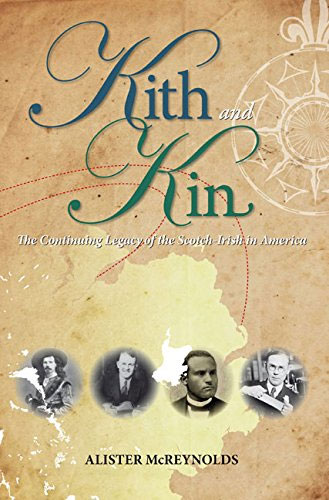 On 14 January 2016 members of Bangor Historical Society enjoyed a very entertaining and informative talk by Alister McReynolds. His topic was ‘Kith and Kin: The Continuing Legacy of the Scotch Irish in America’, the title of a book he wrote in 2013. He began by clarifying the terms Ulster Scots and Scotch Irish. The former term is used in Ulster, but once people crossed the Atlantic they were referred to as Scots Irish or Scotch Irish. When Mr. McReynolds first visited the USA in 1989 the concept of Scotch Irish was not well known, but now it is. He also explained the difference between kith and kin. Kin refers to relatives, while kith applies to friends. The talk was accompanied by a very interesting series of illustrations.
On 14 January 2016 members of Bangor Historical Society enjoyed a very entertaining and informative talk by Alister McReynolds. His topic was ‘Kith and Kin: The Continuing Legacy of the Scotch Irish in America’, the title of a book he wrote in 2013. He began by clarifying the terms Ulster Scots and Scotch Irish. The former term is used in Ulster, but once people crossed the Atlantic they were referred to as Scots Irish or Scotch Irish. When Mr. McReynolds first visited the USA in 1989 the concept of Scotch Irish was not well known, but now it is. He also explained the difference between kith and kin. Kin refers to relatives, while kith applies to friends. The talk was accompanied by a very interesting series of illustrations.
The speaker then talked about the Ulster Scots tongue and the language of Robert Burns. On a visit to Norway he discovered Norwegian words which were similar to local terms e.g. bairn. It is like Northumbrian English, but with Norse terms. Mr. McReynolds went on to explain how his knowledge of Ulster Scots had grown from childhood.
In the main part of the talk we learned about a number of people of Scotch Irish descent who had been prominent in American life. They were often seen as part of the story of the American frontier, but there was more to their lives than fighting and killing.
Rev. George Duffield was a new light Presbyterian whose father came from Ballymena. He graduated from Princeton in 1752 and later became a key advisor to George Washington. Robert Adrain‘s father was a Huguenot who fled from France to Ireland. Adrain was born in Carrickfergus in 1775. He became a United Irishman, but fled to USA and later became Vice-Provost of the University of Pennsylvania. Samuel Brown Wylie succeeded him in that office in 1834. He was born near Ballymena in 1773 and like Adrian fled to America after involvement with the United Irishmen. John Fries Frazer was the third man of Ulster Scots descent to hold the position of Vice-Provost.
Rev. William Martin was born near Ballykelly and was a minister of the Reformed Presbyterian Church or Covenanters. He emigrated in 1772, taking 467 families with him. He supported the American Revolution and an end to slavery. James Logan is commemorated by a blue plaque in Lurgan. He accompanied William Penn to America in 1699. He held various positions in Pennsylvania including the governorship. He was a great academic and had a superb library in his house, ‘Stenton’ and was a friend of Benjamin Franklin.
Thomas Greg and Waddell Cunningham did business in New York and also traded in the West Indies. James McHenry of Ballymena emigrated to America in 1771 where he later became secretary to George Washington. He signed the US Constitution on behalf of Maryland. Captain John Coffee Hayes of Donegal descent, was one of the earliest Texas Rangers and worked for Samuel Houston. He moved to California during the gold rush in 1849.
General Andrew Thomas McReynolds was born in Dungannon in 1808 and later moved to USA, where he distinguished himself in the Mexican and American Civil Wars. Others mentioned included Captain Jack Crawford, scout and member of Buffalo Bill’s Wild West show and General Sinclair Mulholland from Lisburn, a soldier and writer. Joseph Seamon Cotter, junior and senior, were among a number of black people with Scotch Irish blood. More recent Americans with Ulster connections were the writer John Steinbeck, the singer Elvis Presley and the politician Adlai Stevenson.
